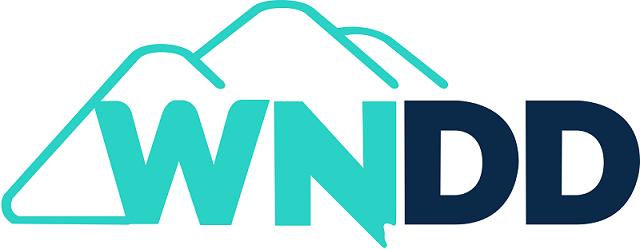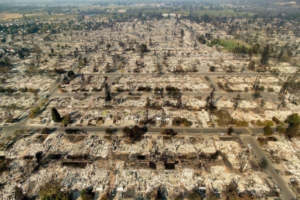Five for Friday: 2023 a Year in Review
Curated by: The Western Nevada Development District…
In this edition of Five for Friday, we review some of the highlights from 2023 for the Western Nevada Development District and its members.
Pyramid Lake Paiute Tribe – Wadsworth Multi-Purpose Center
The Tribe was awarded a $219,000 investment from the Economic Development Administration (EDA) for pre-construction, environmental site review and final design activities for a new Multi-Purpose Cultural and Wellness Center in Wadsworth, the Tribe’s largest population center. The 16,455 square foot facility has been 10 years in the planning and will feature tribal offices, classrooms with a focus on workforce training and a configurable community multi-purpose room that will be ideal for small workshops and conferences. The construction plans also include a large kitchen. Construction costs are expected to be approximately $5 million, and the EDA investment will help the Tribe prepare for other state, local and federal investment opportunities.
Lovelock – USDA Reconnect Program Groundbreaking
USDA Rural Development celebrated the groundbreaking this past fall for a $27 million investment made through the USDA ReConnect Program and was awarded to Uprise Fiber to increase internet access in the City of Lovelock.
Uprise Fiber will utilize the funding to deploy a Fiber-to-the-Home network that will offer economical and dependable internet to Lovelock residents nearly thousands of times faster than their current internet, which can be insufficient for basic activities such as teleconferencing or streaming. This investment will be used to deploy a fiber-to-the-premises network connecting 4,884 people, 130 businesses, 22 farms and 7 public schools to high-speed internet in Pershing County.
Part of the grant application employed WNDD’s Broadband Mapping Speed Test. The Nevada Speed Test was used to assist grant administrators and internet service providers to verify the impact of their programs and intended targets in real time without relying on out-of-date historical maps.
WNDD Announces the City of Yerington as Its Newest Member
The City of Yerington became the 7th city to join WNDD. Economic Development Districts are cities’ local connection with the Department of Commerce’s Economic Development Administration, providing locally-based, regionally driven economic development plans and grant resources for the infrastructure needed to support the strategic blueprint.
WNDD will partner with the city to improve airport infrastructure, assist workforce development and training initiatives and support Main Street projects. The City of Yerington joins the counties of Douglas, Humboldt, Mineral, Pershing, Storey and Washoe; the municipality of Carson City; the cities of Fallon, Fernley, Lovelock, Reno, Sparks, Winnemucca; and the Pyramid Lake Paiute Tribe as WNDD members.
WNDD Annual Program Meeting
In August, the annual WNDD Program Meeting hosted nearly 40 members and guests to tour the Reno-Stead Water Reclamation Facility. Attendees received an update on the OneWater Nevada water reuse project. Lunch was held at the Sierra Nevada Job Corps Center where attendees learned about programming and toured the facility. EDA’s John Edmond and Civil Engineer, Luis Aguilar, were on hand to give some grant writing and project management tips. The EDA teams also met with the Pyramid Lake Paiute Tribal Chairman, James Phoenix, for a tour of key economic development sites and project areas at Nixon and Wadsworth.
EDA Tech Hub Designation
The University of Nevada, Reno (UNR) and its consortium partners, including WNDD, were successful in their application to become a designated Tech Hub by the U.S. Department of Commerce’s Economic Development Administration (EDA).
EDA granted the designation to the University’s Lithium Batteries and Other EV Material Loop, which aims to build a self-sustaining and globally competitive lithium lifestyle cluster, covering extraction, processing, manufacturing, and recycling.
UNR is one of 32 new tech hubs within the states and Puerto Rico, representing a cross-section of urban and rural regions. Designation is an endorsement of the region’s plans to supercharge their respective technological industries to create jobs, strengthen U.S. competitiveness, and protect national security. The program was authorized by the CHIPS and Science Act, signed into law in August of 2022.
Tech Hub Designees are eligible to apply for the Tech Hubs Phase 2 Notice of Funding Opportunity (NOFO). In Phase 2, EDA will award implementation grants to 5 to 10 Designated Tech Hubs, with each of those Hubs receiving approximately $40 to $70 million.
Humboldt County EPA Brownfields Community Assessment Grant
This past summer, WNDD participated in the Kickoff Meeting for the Humboldt County EPA Brownfields Community Assessment Grant held in Winnemucca. The EPA’s Brownfields program provides technical assistance to communities, states, and tribes to assess, safely clean up and sustainably repurpose underutilized or blighted properties.
The redevelopment of vacant or underutilized land is an opportunity for new growth. This grant funding can be a pathway to new economic opportunities, private investment, and improved quality of life for Humboldt and Pershing County residents.
A partnership between Humboldt and Pershing counties, the grant is being administered through Humboldt County and the Nevada 95-80 Regional Development Authority. As a sub-awardee, WNDD will assist with community outreach and engagement activities. Converse Consultants is providing the Environmental Consulting Services that will lead the environmental assessment efforts, and reuse planning.
…but wait there’s more!
WNDD Planning Program Grant and CEDS Update Workshop
EDA announced in June a $240,000 Partnership Planning grant for WNDD for FY2023 thru FY2025. This EDA planning investment supports the development and implementation of a comprehensive economic development strategy (CEDS) for the region served by WNDD, which consists of nine counties and seven municipalities. The CEDS process is designed to bring together the public and private sectors in the creation of an economic development roadmap to diversify and strengthen the regional economy.
WNDD members and local stakeholders participated in a workshop facilitated by the University Center for Economic Development, part of the College of Business at the University of Nevada, Reno to evaluate and update WNDD’s 2020 through 2025 CEDS. These funds will help sustain these collaborative regional planning efforts. Workshop participants included WNDD members and key community stakeholders who were given an opportunity to evaluate the existing strategic economic development vision, goals, and actionable items. They also prioritized projects, assessed existing local and regional socio-demographics, and economic and housing conditions. The workshop completed a revised Strengths, Weaknesses, Opportunities, and Threats (SWOT) Analysis for the region, and teed up the final selection of revised priority CEDS projects for the coming year.
Shout out to Frederick Steinmann, DPPD, Director of the University Center for Economic Development for facilitating a brisk and meaningful workshop.
Mineral County and Partners Receive USDOT Thriving Communities Program Grant
Mineral County and community partners Walker River Paiute Tribe and Mineral County School District received a Technical Assistance grant through the U.S. Department of Transportation’s (USDOT) Thriving Communities Program.
The County is working to implement a shared community revitalization plan by merging the community capacity needs for the Babbitt Industrial Park site with the infrastructure needs of the town of Hawthorne. The Thriving Communities Program support will help to advance local storm water infrastructure improvements to repair roadways from flooding events and improve community mobility. Through the Thriving Communities Program, USDOT selects and funds Capacity Builder teams to provide deep-dive technical assistance, planning, and capacity building support to under-resourced and disadvantaged communities across the U.S.
The goal is to assist communities with the technical tools and organizational capacity to comprehensively plan for and deliver quality infrastructure projects and community development projects that enable their communities and neighborhoods to thrive.
WNDD Summit Hits a Homerun
More than 100 were in attendance at the Western Nevada Development District Summit: “Show Me the Money — How to Get Your Next Grant” held last January at the Atlantis Casino Resort Spa in Reno. Attendees learned the latest grant writing and management tools and techniques from a wide range of speakers representing state, federal and private organizations working in the grant sector.
An abundance of insight into the world of grants was shared with attendees at the Summit. Guest speaker presentations are perfect reference tools as you work towards getting that next grant for your community.
Workshops with EDA’s Seattle Region Team
Members of the Western Nevada Development District along with host, the University of Nevada College of Business Center for Economic Development, welcomed Regional Director Sheba Person-Whitley and EDA Nevada Representative John Edmond from the Economic Development Administration’s Region VI Office last January for roundtable discussions and a local infrastructure tour through the City of Reno. WNDD members had the opportunity to share potential EDA grant eligible projects with the representatives, while UCED Director Fred Steinmann reviewed the Center’s work on establishing new Development Districts throughout the state and assisting communities with Comprehensive Economic Development Strategies.
The Regional Director, Nevada Representative, Storey County, NNDA, EDAWN and WNDD representatives toured the Tahoe-Reno Industrial Center (TRIC) in McCarran, NV the following day to show the economic growth occurring in Northern Nevada.
Thank You to Our Members and Associate Members
WNDD sends a heartfelt thank you to all of our Members and Associate Members for your support in 2023, and we look forward to continuing to serve you in 2024!

 Hurricane Harvey was a Category 4 storm that hit Texas on August 25, 2017. It caused $125 billion in damage according to the National Hurricane Center. The storm dumped 1 trillion gallons of rain on Houston in four days, forcing 32,000 people out of their homes and into shelters There were 61 drinking water facilities that were inoperable and 203 boil-water notices in effect. Another 40 wastewater treatment facilities were inoperable.
Hurricane Harvey was a Category 4 storm that hit Texas on August 25, 2017. It caused $125 billion in damage according to the National Hurricane Center. The storm dumped 1 trillion gallons of rain on Houston in four days, forcing 32,000 people out of their homes and into shelters There were 61 drinking water facilities that were inoperable and 203 boil-water notices in effect. Another 40 wastewater treatment facilities were inoperable. The Tubbs Fire started the evening of Oct. 8, 2017 and burned a total of 36,807 acres in Napa and Sonoma counties — destroying 5,636 structures and resulting in the deaths of 22 civilians Much of the fire’s destruction was in Santa Rosa, particularly in the Coffey Park and Fountaingrove neighborhoods. The estimated cost of the fire’s destruction is between $7.8 to more than $10 billion.
The Tubbs Fire started the evening of Oct. 8, 2017 and burned a total of 36,807 acres in Napa and Sonoma counties — destroying 5,636 structures and resulting in the deaths of 22 civilians Much of the fire’s destruction was in Santa Rosa, particularly in the Coffey Park and Fountaingrove neighborhoods. The estimated cost of the fire’s destruction is between $7.8 to more than $10 billion. The COVID-19 pandemic highlights that we have entered the internet of all things, people and systems. Connectivity is essential for creating and sustaining economic growth and providing improved government services. This has also introduced enormous risks. Business and government agencies are increasingly a target for hackers and cybercrime, both globally and locally: SolarWinds, a major US information technology firm, was the subject of a cyberattack that spread to its clients and went undetected for months. In 2019, the Lyon County School District was the victim of a computer ransomware virus attack.
The COVID-19 pandemic highlights that we have entered the internet of all things, people and systems. Connectivity is essential for creating and sustaining economic growth and providing improved government services. This has also introduced enormous risks. Business and government agencies are increasingly a target for hackers and cybercrime, both globally and locally: SolarWinds, a major US information technology firm, was the subject of a cyberattack that spread to its clients and went undetected for months. In 2019, the Lyon County School District was the victim of a computer ransomware virus attack.